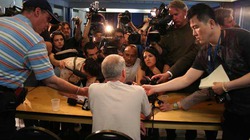As G20 nears, battle lines drawn over rights, security
On Wednesday, five organizers involved with planning the upcoming G20 protests were visited at home or at work by security officials in Toronto.
The officials identified themselves as Canadian Security and Intelligence Service agents, according to Syed Hussan, an organizer with the Toronto Community Mobilization Network, which is coordinating next month’s protests.
“It’s random targeting,” Hussan said. “We’re talking about young students, we’re talking about people who are retired.”
Each was asked about “their political work and affiliations” and their views on protest tactics, said Macdonald Scott, a member of TCMN’s legal team.
A spokesperson for CSIS said that the agency could not comment on anything to do with its intelligence gathering operations. But the questioning sessions appear to represent the latest episode in a game of cat and mouse between security officers and protesters in the lead up to the G20 summit on June 26-27.

For months, Toronto police have been trying with mixed results to speak with protest organizers. TCMN maintains that CSIS, the agency responsible for rooting out threats to Canada’s national security, is now also approaching them.
Rights issues
TCMN calls such encounters “police harassment,” and Hussan said the group plans to publish a list of at least 27 documented instances of them next week.
The unannounced police visits have also caught the attention of the Canadian Civil Liberties Association, a legal agency that promotes respect for “fundamental freedoms.”
On Friday, the CCLA met in a private law office with the Integrated Security Unit, a hybrid of police and military forces that’s planning the enormous security operation for the international summit.
In a statement released hours later, the CCLA said it was concerned about the “unprecedented” security arrangements being planned for the G20, including “pre-summit interactions with potential protesters.”
“There are powers of the police that should not be used to undermine a legitimate and peaceful protest,” said Nathalie Des Rosiers, a CCLA spokesperson.
The CCLA is also concerned with how sonic weapons will be used during the demonstrations, and under what conditions protesters could be arrested en mass. It’s also worried about the size of the security perimeter around the summit and the creation of a “designated demonstration area.”
“The role of the police is also to protect the right of freedom of assembly, not to see this right as an impediment to the meeting or an impediment to security,” Des Rosiers said. “It’s like the Santa Clause Parade. It causes some inconvenience, but it’s a good thing.”
Meaghan Gray, a spokesperson for the Security Intelligence Unit, said that Toronto police are working on guidelines about the use of sonic weapons, which can blast audio messages or emit a painful sound that can immobilize a crowd.
Focus on causes
While many details about the summit’s security have yet to be released, protest organizers held a press conference on Thursday to outline why they want to hold demonstrations.
“After many months of planning, this is sort of our coming out party,” said Claudia Calabro, a spokesperson for the TCMN.
Nine independent groups who are planning to join in the protests spoke about a range of issues.
Anna Willats, an organizer with Gender Justice for All, criticized the exclusion of abortion funding from Prime Minister Stephen Harper’s maternal and child health agenda for the G8.
A spokesperson for an environmental group noted that Ottawa has refused a request by United Nations Secretary-General Ban Ki-moon to address climate change at the G20 meeting.
Organizers were then asked about the recent firebombing of a Royal Bank branch in Ottawa. But they declined to comment on the incident.
“We’re not here to talk about what happened in another city,” said Lesley Wood, who answered questions on behalf of TCMN.
That firebombing took place overnight on Monday and caused $500,000 in damages. A group identifying itself as “FFFC – Ottawa” posted a video online of the bank in flames, and claimed responsibility. RBC’s funding of the 2010 Winter Olympic Games and of the oilsands prompted the attack, the group said, adding that it plans to visit Toronto in June.
The groups involved with planning the G20 demonstrations have a peaceful reputation, according to Janet Conway, the Canada Research Chair in Social Justice at Brock University.
“They have absolutely no history of this kind, and nobody in any activist circle that I know is aware of who this group is in Ottawa,” she told CTV.ca on Friday. “If there’s some window-breaking, or some kind of violent encounter with police, this will be the work of a tiny minority if it happens at all.”
Whatever uneasiness there is among protest groups about the firebombing, organizers of mass demonstrations often agree not to publicly criticize the tactics that other activists use, Conway said, in the hopes of pushing issues they’re concerned with to the forefront.
“That’s not the main story from the point of view of the organizers,” she said. “There’s a sense that national parliaments are not reflective of popular will, and even less so at these gatherings.”
“The growing protests over the last decade reflect that all over the world.”
Source: http://www.ctv.ca/servlet/ArticleNews/story/CTVNews/20100522/g20-protest-police-100523/20100523?hub=Canada



